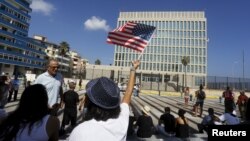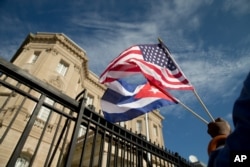The celebratory atmosphere surrounding the raising of the U.S. flag over the American Embassy in Havana quickly gave way to an exchange of sharp barbs between Secretary of State John Kerry and his Cuban counterpart over human rights.
The exchange made clear that, while new channels may be opening for the countries to discuss their differences, resolving those differences will be much more difficult.
Kerry, under pressure from human rights advocates and political opponents at home, stressed the issue during a joint news conference with Cuban Foreign Minister Bruno Rodriguez that followed Friday's flag-raising.
Cuba, he said, "would be best served by a genuine democracy, where people are free to choose their leaders, express their ideas and practice their faith; where the commitment to economic and social justice is realized more fully; where institutions are answerable to those they serve; and where civil society is independent and allowed to flourish."
Unfazed, Rodriguez fired back with criticism of the United States' own human rights record, in particular a wave of incidents in which unarmed black men have been killed by police officers. He also alluded to America's use of its naval base at Guantanamo Bay, Cuba, to indefinitely detain Islamist extremists captured during the U.S. war on terror.
"Cuba isn't the place where there's racial discrimination, police brutality or deaths resulting from those problems," he said. "The territory where torture occurs and people are held in legal limbo isn't under Cuban jurisdiction."
'Not on a par'
Kerry rejected those accusations during a later discussion with reporters, saying incidents like the shooting death of teenager Michael Brown in Ferguson, Missouri, are not endorsed by government policy.
"I hear it from a number of other countries in the world when we talk to them about human rights," he said. "You get the same kind of pushback: 'Well, you guys have Ferguson, you guys have Brown who was killed.' And I’ve heard it very directly.
"It’s not on a par, it’s not the government ... not an administration, not a pervasive government policy that we effect. It’s just not. Everybody here at this table knows that. That’s a huge distinction.”
Complaints about Kerry's handling of the occasion began well before Friday's flag-raising, with critics objecting that Cuban dissidents were not invited to the ceremony. Rather than risk a boycott of the event by Cuban officials, the Americans invited several prominent dissidents to a separate event with civil society leaders and the head of Cuba's Catholic Church.
In an interview Wednesday with the Telemundo network, Kerry described the formal flag-raising as "a government-to-government moment, with very limited space, by the way, which is why we're having the reception later in the day at which we can have a cross-section of civil society, including some dissidents.
"The message is, No. 1, that we believe our engaging in direct diplomatic relations with the Cuban government, being there, being able to interact with the people of Cuba, will in fact help the people of Cuba,'' he said.
But the argument carried little weight with American critics of the policy such as Marco Rubio, a U.S. senator from Florida and a Republican presidential candidate.
"In the eyes of [President] Barack Obama and Hillary Clinton, his former secretary of state, the Cuban people are suffering because not enough American tourists visit that country, when in truth the Cuban people are suffering because they live under a tyrannical dictatorship," he said Friday.
'Politically driven' report
Rubio has previously criticized the U.S. State Department's recent upgrade of Cuba's standing in its annual human trafficking report as "politically driven" and said the country has done "almost nothing" to curb child sex tourism on the island.
"The administration's unfounded elevation of Cuba on human trafficking sends a chilling message that the U.S., at least under this president, is more interested in headlines about its historic Cuba policy than it is in challenging the Castro regime to protect Cuba's youth from human trafficking exploitation," Rubio wrote to Kerry.
The report upgraded Cuba from the lowest "Tier 3" ranking to the "Tier 2 Watch List," reserved for countries deserving special scrutiny, even as the report was still highly critical of Havana.
Press freedom
The president of a major Washington journalism group, John Hughes of the National Press Club, urged Kerry this week to make news media freedom and Internet access in Cuba a priority for U.S. policymakers.
"It's hard to imagine human rights, labor conditions and corruption in the country getting any better absent the public accounting that comes with a reasonably free press," Hughes said. "Therefore, the United States should use all tools at its disposal, including diplomatic and economic, to support unrestricted reporting and the dissemination of information in Cuba."
Cuba is located 145 kilometers off the southeastern U.S. coast, but the two countries broke off diplomatic ties in 1961 after Cuban revolutionary Fidel Castro seized power in 1959. The current Cuban leader, President Raul Castro, and Obama announced a resumption in formal relations last December, and talks have been held since then to ease business, trade and travel restrictions.






